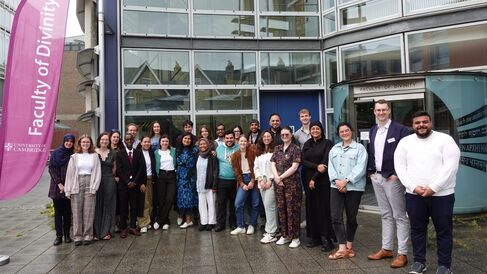
In July 2024, we welcomed nearly two dozen participants for a 5-day Religion & Climate Futures summer school. The curriculum was organised and delivered in partnership with an LSE team.
Maria Isabel Giraldo reflects on the experience:
“I used to think that the top global environmental problems were biodiversity loss, ecosystem collapse, and climate change (…) but I was wrong. The top environmental problems are selfishness, greed, and apathy, and to deal with these we need a spiritual and cultural transformation. And we scientists don’t know how to do that.”
— Professor Gus Speth, Harvard University
At the end of my Master’s studies in London, while writing my dissertation on the care economy and social policy in Bogotá, Colombia, I had the opportunity to attend the Religion and Climate Futures Summer School, hosted by the Cambridge Interfaith Programme and LSE Religion & Global Society.
My journey into sustainability
For me, this experience was truly unique. I come from a country where Catholicism is the dominant religion, and it is not typically associated with climate action, at least not in the eyes of the average citizen. As a devout Catholic myself, I believe deeply in the Gospel’s message of love and justice, and that it can, and should, transform our behaviours. My journey into sustainability began through my faith, particularly after reading Pope Francis’ encyclical Laudato Si. However, growing up in Colombia meant I had little contact with other religions. I was aware of their richness theoretically but had never experienced it first-hand.
Arriving in London and participating in programmes at LSE, and eventually Cambridge, provided me with the experience I had been yearning for. It helped me confront the questions that had been brewing in my mind. How do we live in peace in such a diverse world, one filled with conflict, scarcity, and injustice? Can we truly care for our planet collectively, given our vastly different lifestyles, beliefs, and aspirations? Who holds the power to activate real change: governments, diplomats, leaders, or rather individuals, communities, and families?
And most importantly, in the face of climate collapse, is hope—a virtue shared by all major world religions—still possible?
Climate and the human heart
This was a week of immersing ourselves in sacred texts from different traditions, listening to academics, activists, and leaders, and engaging in deep conversations. It wasn’t just another course focused on the approaching climate catastrophe due to resource depletion or an economy surpassing planetary limits. Rather, it was a gathering of people from diverse disciplines, faiths, and cultures, to explore the deeper causes of climate change and what it reveals about society, institutions, and, most crucially, the human heart.
The Summer School was both intellectually stimulating and spiritually challenging. It made me realise the power of collective action when rooted in beliefs. The differences in our faiths, far from being obstacles, could, if we learn to truly listen to each other, be the key to facing the uncertainties of the future. Throughout the week, we worked in groups on projects linking climate change and religion, striving to find tangible solutions. It was a tough task, yet it allowed us to grasp the complexity of the issues and the level of commitment required to address them. We ventured together into vulnerability, a term often used in environmental discourse, but not commonly embodied in academia.
We gradually understood the role courage and religious imaginations can play in "finding solutions". These imaginations allow us to envision alternative worlds, not dominated by profit-making and competition, but shaped by care, cooperation, and interdependence. I am convinced there is a path towards the spiritual transformation we all need, and it begins within each of us and our communities.
There is hope
I am still reflecting on the answers to my questions. But one thing I am certain of: there is hope. Hope in climate activists across the globe, in religious communities, and in local leaders. Hope because both ecosystems and people have the capacity for resilience. Hope because we still have the courage to use our moral imagination to create possible futures—radical, peaceful, communal, and truly green.
While we acknowledge the deep injustices and short-term focus of our current political, economic, and social systems, our individual and collective agency remains a powerful tool for change. And this change isn’t just technological or scientific—it is ethical and spiritual. It is a transformation of the heart.
Further information
The Religion and Climate Futures summer school (Cambridge, 1–5 July 2024) was sponsored by the Templeton Religion Trust as part of a Religion & Global Pluralities project led by the LSE Religion & Global Society research unit. A number of participants received bursaries to assist with the cost of attendance.
Keen to join us in 2025? Bookmark www.interfaith.cam.ac.uk/summer for the latest information on our offer.
